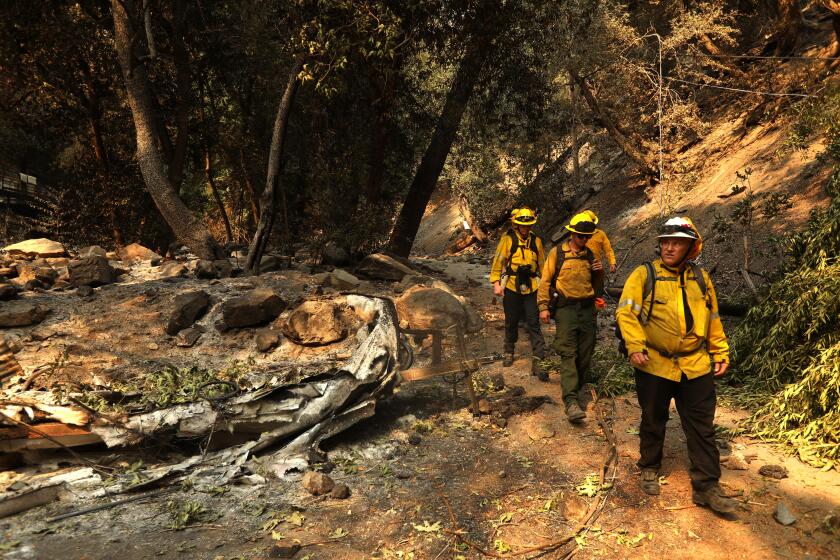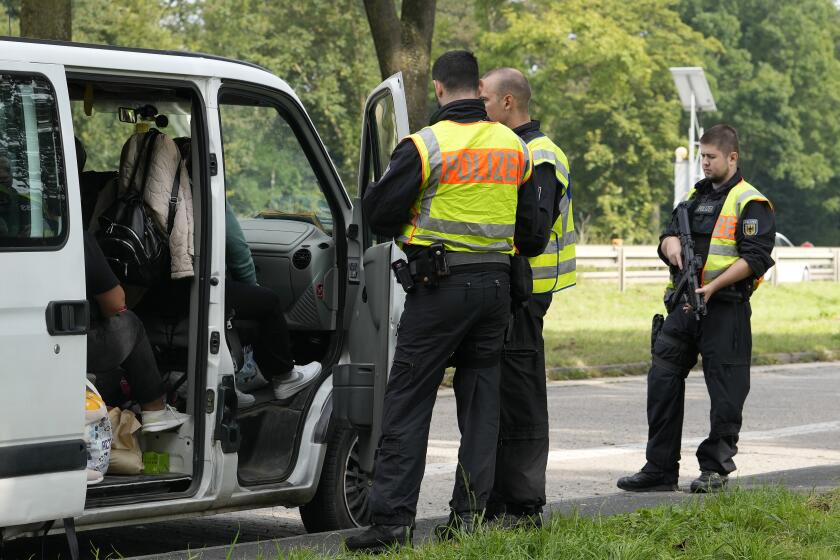The Jonesboro Tragedy: Consequences Teach a Chilling Truth
One of the boys in a juvenille detention center in Jonesboro, Ark., has told visitors that he wishes the whole thing had never happened. The other wants to go home to his mama.
All last week, after the terrible morning at Westside Middle School, where bullets killed four students and a teacher and wounded 10, we adults have been wringing our hands, saying we do not understand children anymore. We say we do not recognize the two boys emerging out of the forest, dressed in camouflage, rifles in hand, as our children.
In truth, nothing is surprising about the cruelty of children. It is as routine as a boring summer day when kids torture insects or animals. All of us remember from our own childhoods bullies and midget tyrants. One child puts a razor blade in a bar of soap in the school bathroom; another places broken glass in the playground sand. Another torches the dumpster behind the church--”just to see what will happen.”
In truth, nothing is as terrible as the “innocence” of childhood. A man I know shudders as he remembers a June day, many years ago, when he shot another boy with a BB gun, out of some terrible curiosity. He remembers the gaping black circle he caused on his friend’s thin leg. He remembers the dull, comprehending moment of regret, as several adults came running across the lawn.
In some less-innocent America, adults used to scold and lecture children (their own and the neighborhood kids), trying always to teach them that actions had consequences.
I used to hang out, as a kid, with a group of middle-class boys who, when boredom settled in, would bicycle out to the edge of town to throw rocks at an encampment of hobos. “Bombing the bums,” we used to call it. (We must have been 10 or 11 years old at the time.) When one of our fathers heard about it, he gathered us in his living room and promised us consequences. Made us imagine consequences: “If I ever catch you doing that again . . . “
I can still hear that man’s threat, hanging in the air over several decades. But it seems now to belong to a different century, another America. For the country in which we live is a nation filled with adults who have no sense of consequences in their own lives, and thus no possibility of ever teaching their children.
Last week, after Jonesboro, small-town America was blaming big-city America for its troubles. Hollywood producers were responsible for “desensitizing our children to violence.” Lawyers readied class-action suits against gun manufacturers. The gang culture of South Central L.A. had infected pastoral Jonesboro. (Hadn’t one of the boys in the massacre bragged to his classmates that he was a member of the “Bloods”?)
Then there were some in big cities who talked about the violence in those little white towns, bordered by the Baptist church and Wal Mart. Take the Greyhound bus south and you ride into the darkest sector of the American soul: West Paducah, Pearl, Lynnville, Blackville, Stephen King territory.
Some adults thought that the solution to the violent young is longer jail terms: “Give ‘em life!” An army of child psychologists on CNN had one therapy or another to recommend. And, from Africa where he was touring, President Bill Clinton came up with the idea of asking Atty. Gen. Janet Reno to convene a panel of experts to study the problem of youth run amok.
All week long, one had the sense that none of the experts had ever read William Golding’s “Lord of the Flies” or been to summer camp. One had the sense, too, that few adults in America could imagine what it is like to be a kid today in a country where there are no consequences.
We adults take a pill or get an abortion or otherwise avoid any unwanted consequences; we blame the city, if we are in the suburbs, or we blame the suburbs, if we are in the city; we blame Freud’s mother for the way we behave, or we blame the priest; we sue the cigarette company when we get emphysema or we sue McDonald’s when the coffee scalds our thighs. We take kids to movies in which people get their heads blown off, but we blame Bruce Willis when our kids come out of the theater with eyes drained of all color.
We live in an America where adults assume no consequences. So why should we be surprised that our children are missing the crucial lesson of their moral education?
Samuel Beckett, the absurdist Irish playwright, was stabbed one day in Paris by an utter stranger. Beckett survived the attack. Later, he visited the prison to meet his assailant, to ask: Why?
The prisoner had nothing to say. To each of Beckett’s questions, he would only mumble, “I don’t know.” There is no more chilling answer an adult can give. It is a robotic answer, a childish lament: I don’t know why I did it.
The air in America is full of adults saying it. We don’t know. We don’t know. In such an America, what room is there for contrition or confession or self-knowing? In such a nation, despite all the talk this week about the “horror” in Jonesboro and the “terror” on the schoolyard and the “trauma,” who speaks of contrition or guilt?
The father in Jonesboro gave his son a gun one Christmas, even taught him how to use it. He apparently did not teach him as well that the gun is real (not a Warner Bros. prop) and that a bullet has flesh-and-blood consequences.
The grandfather was on TV the other night, weeping at the sudden discovery of the grandson he did not know. He seemed as much a child as the imprisoned boy.
Now, they both know. And they don’t. One of the boys in the Jonesboro jail has told visitors that he doesn’t remember even pulling the trigger, so disconnected is he from his own behavior.
We alternately want them to be punished for their grievous action--we adults want the Arkansas law that tempers the punishment of minors to be superseded by federal law. But we also recognize the pathos of the boys’ plight.
We wish we could save them from the prison of consequence. It cannot be done. This is the nature of tragedy. Those two boys will never escape the consequence of what they have done. It is their imprisonment--and ours.
Sign up for The Wild
We’ll help you find the best places to hike, bike and run, as well as the perfect silent spots for meditation and yoga.
You may occasionally receive promotional content from the Los Angeles Times.



